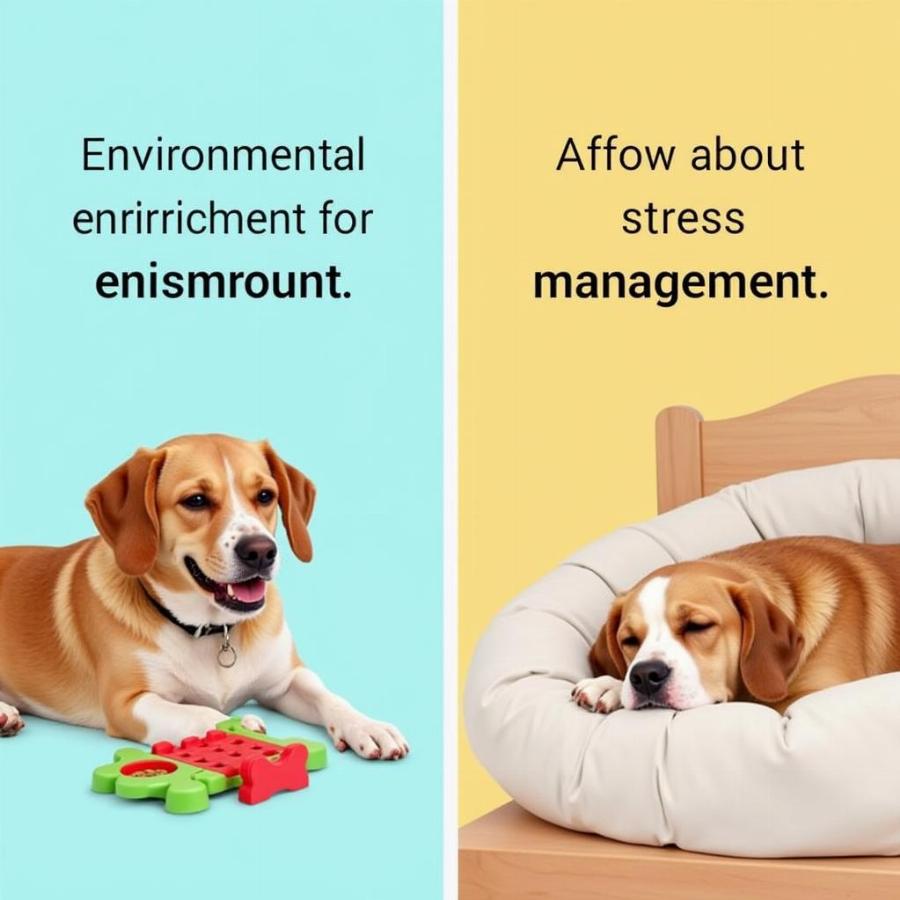Is it normal for a dog to eat hair? Many dog owners have witnessed their furry friend indulging in a bit of hair-chewing, whether it’s their own, another dog’s, or even hair found around the house. While this behavior can be unsettling, it’s not always cause for alarm. Understanding why dogs eat hair can help you determine if it’s a harmless quirk or a sign of a more serious issue.
Why Does My Dog Eat Hair?
Several factors can contribute to a dog’s hair-eating habit. Sometimes, the reason is purely behavioral, while in other cases, an underlying medical condition may be the culprit. Let’s explore some common explanations for why a dog might eat hair.
Behavioral Reasons for Hair Eating
- Boredom or Anxiety: Just like excessive licking or chewing on furniture, hair eating can be a sign of boredom or anxiety in dogs. If a dog isn’t getting enough physical and mental stimulation, they may engage in this behavior as a way to self-soothe.
- Learned Behavior: Puppies, especially, explore their world through their mouths. They might ingest hair accidentally while playing or grooming, and if they find the texture or taste appealing, they may continue the habit into adulthood.
- Stress: Stressful situations, such as changes in routine, the arrival of a new pet, or loud noises, can trigger unusual behaviors in dogs, including hair eating.
Medical Reasons for Hair Eating
- Pica: Pica is a medical condition characterized by the persistent craving and consumption of non-food items. Dogs with pica may eat a variety of things, including hair, dirt, rocks, and fabric. This condition can be caused by nutritional deficiencies, hormonal imbalances, or underlying medical issues.
- Nutritional Deficiencies: In some cases, hair eating can indicate a nutritional deficiency in a dog’s diet. They may instinctively seek out hair as a way to compensate for missing nutrients.
- Gastrointestinal Issues: While less common, hair eating can sometimes be a symptom of underlying gastrointestinal problems.
When to Worry About Your Dog Eating Hair
While occasional hair ingestion might not be a significant concern, excessive or persistent hair eating can lead to health problems.
Potential Health Risks of Hair Eating
- Bezoars: A bezoar is a mass of undigested material, in this case, hair, that can form in a dog’s stomach or intestines. Bezoars can cause blockages, leading to vomiting, constipation, loss of appetite, and even more severe complications.
- Gastrointestinal Irritation: Ingesting large amounts of hair can irritate the lining of the digestive tract, causing inflammation, discomfort, and diarrhea.
What to Do if Your Dog Eats Hair
If you’re concerned about your dog’s hair-eating habit, consult your veterinarian. They can help determine if there’s an underlying medical cause and recommend appropriate treatment.
Tips for Addressing Hair Eating
- Increase Environmental Enrichment: Provide your dog with plenty of toys, puzzles, and opportunities for exercise to combat boredom and anxiety. Consider activities like puzzle feeders, hide-and-seek games, or interactive play sessions.
- Manage Stress: Identify and address any potential stressors in your dog’s environment. Create a safe and comfortable space for them to retreat to when feeling overwhelmed. dogs belly turned dark can sometimes be a sign of stress in dogs, so pay attention to any physical changes.
- Nutritional Evaluation: Work with your veterinarian to ensure your dog is receiving a complete and balanced diet. They can recommend specific food or supplements if necessary.
- Training and Behavior Modification: Consult a certified dog trainer or behaviorist to help address any underlying behavioral issues contributing to the hair eating. This might involve techniques such as positive reinforcement, redirection, or desensitization.
 Dog Eating Hair Solutions
Dog Eating Hair Solutions
Conclusion
Is it normal for a dog to eat hair? In small amounts, it might be. However, frequent or excessive hair eating can be a sign of a behavioral or medical issue and should not be ignored. By addressing the underlying cause and taking proactive steps, you can help your dog break this habit and maintain their overall health and well-being. If you’re concerned about your dog’s hair-eating, consult your veterinarian. Just like understanding the dog pain scale is important, so too is understanding your dog’s behavior.
FAQ
- Is all hair eating bad for dogs? No, occasional hair ingestion is usually not harmful. However, excessive hair eating can lead to health problems.
- Can dogs digest hair? Dogs cannot digest hair, but small amounts can usually pass through the digestive system without issue.
- What are the signs of a hairball blockage in a dog? Vomiting, constipation, loss of appetite, and lethargy can be signs of a blockage.
- How can I stop my dog from eating hair? Address underlying boredom, anxiety, or medical issues. Provide enrichment, manage stress, and consider training.
- When should I contact my vet? Contact your vet if your dog is eating hair excessively or showing signs of illness.
Other Questions You Might Have
- Do you wonder why do dogs lick their butts? This seemingly odd behavior actually has several explanations.
- Are you considering bringing a feline friend into your home? Learn about cats that are good with dogs to make the transition smooth.
- Does dog hair get in your dog’s eyes? Find out if does dog hair bother a dogs eys.
Beaut Dogs is your trusted source for expert advice on all aspects of dog ownership. From choosing the right breed to providing comprehensive care guides, we are dedicated to helping you navigate the wonderful world of dogs. When you need support, please contact us via Email: [email protected] to get detailed and accurate answers from Beaut Dogs. Beaut Dogs, we’re passionate about dogs and committed to providing reliable information to the dog-loving community. Visit us at https://beautdogs.com.